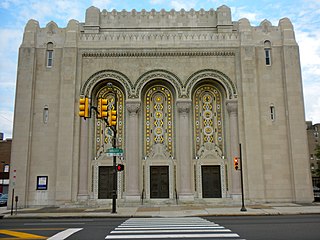Related Research Articles

A synagogue is a Jewish (mainly) or Samaritan (rarely) house of worship. Synagogues have a large place for prayer and may also have smaller rooms for study and sometimes a social hall and offices. Some have a separate room for Torah study, called the בית מדרש beth midrash, lit. "house of study".
Jewish religious movements, sometimes called "denominations" or "branches", include different groups which have developed among Jews from ancient times. Today, the main division is between the Orthodox, Conservative, and Reform, with several smaller movements alongside them. This denominational structure is mainly present in the United States, while in Israel, the fault lines are between Haredi Judaism, Religious Zionism, Masortim (traditional) and Hiloni (secular) Jews.
Jewish leadership has evolved over time. Since the destruction of the Second Temple in Jerusalem in 70 CE, there has been no single body that has a leadership position over the entire Jewish diaspora. Various branches of Judaism, as well as Jewish religious or secular communities and political movements around the world elect or appoint their governing bodies, often subdivided by country or region.

The World Union for Progressive Judaism (WUPJ) is the international umbrella organization for the various branches of Reform, Liberal and Progressive Judaism, as well as the separate Reconstructionist Judaism. The WUPJ is based in 40 countries with 1,275 affiliated synagogues, of which 1,170 are Reform, Progressive or Liberal and 105 Reconstructionist. It claims to represent a total of some 1.8 million people, both registered constituents and non-member identifiers. The WUPJ states that it aims to create common ground between its constituents and to promote Progressive Judaism in places where individuals and groups are seeking authentic, yet modern ways of expressing themselves as Jews. It seeks to preserve Jewish integrity wherever Jews live, to encourage integration without assimilation, to deal with modernity while preserving the Jewish experience and to strive for equal rights and social justice.
Capers C. Funnye Jr. is an African-American rabbi, who leads the 200-member Beth Shalom B'nai Zaken Ethiopian Hebrew Congregation of Chicago, Illinois, assisted by rabbis Avraham Ben Israel and Joshua V. Salter.

Congregation Rodeph Shalom of Philadelphia, founded in 1795, is the oldest Ashkenazic synagogue in the Western Hemisphere. It is noted historically for its leadership of the Reform Judaism among American Hebrew congregations, for its spiritual influence upon international Jewry, and for its unique 1927 Moorish Revival building on North Broad Street, on the National Register of Historic Places for many decades.
Congregation Beth Israel is an egalitarian Conservative synagogue located at 989 West 28th Avenue in Vancouver, British Columbia. It was founded in 1925, but did not formally incorporate until 1932. Its first rabbi was Ben Zion Bokser, hired that year. He was succeeded the following year by Samuel Cass (1933–1941). Other rabbis included David Kogen (1946–1955), Bert Woythaler (1956–1963), and Wilfred Solomon, who served for decades starting in 1964.
Congregation Beth Israel Abraham Voliner is an Orthodox Jewish congregation in Overland Park, in the Kansas City Metropolitan Area. Formally established as Tefereth Israel in Kansas City, Missouri in 1894, by 1960 it had moved several times, and merged with three other congregations, taking on its current name. Responding to demographic shifts in Kansas City's Orthodox community, it opened a branch in Overland Park in 1987, and in 1994 it moved to its current location at 9900 Antioch Road.
Jacob B. Agus was a Polish-born American liberal Conservative rabbi and theologian who played a key role in the Conservative Rabbinical Assembly.
The first openly lesbian, gay, bisexual, and transgender clergy in Judaism were ordained as rabbis and/or cantors in the second half of the 20th century.
Masorti Olami builds, renews and strengthens Jewish life throughout the world, with efforts that focus on existing and developing communities in Europe, Latin America, the Former Soviet Union, Africa, Asia and Australia. More than 135 kehillot (communities) are affiliated with Masorti Olami in Argentina, Aruba, Australia, Bolivia, Brazil, Chile, Colombia, Cuba, the Czech Republic, El Salvador, France, Germany, Honduras, Hungary, India, Israel, Japan, Kenya, Mexico, the Netherlands, Paraguay, Peru, Poland, Portugal, Russia, South Africa, Spain, Sweden, Uganda, Ukraine, Uruguay, the United Kingdom and additionally, more than 600 in Canada and the United States of America. All of its activities are conducted within the context of the overall Conservative Judaism movement, in close cooperation with its affiliated organizations in North America and Israel.
Sephardic Temple Tifereth Israel, also called The Sephardic Temple, is a large, urban Sephardi Jewish synagogue located in Westwood, Los Angeles, California at the corner of Wilshire Boulevard and Warner Avenue. Established on February 1, 1920 as the "Sephardic Community of Los Angeles," it exists today as the merger of three major Sephardic organizations with approximately 600 member families.
Steven Blane is an American rabbi, cantor and recording singer-songwriter.

Joseph Dweck is the senior rabbi of the S&P Sephardi Community of the United Kingdom.

This is a timeline of women rabbis.

The Jewish community of Houston, Texas has grown and thrived since the 1800s. As of 2008 Jews lived in many Houston neighborhoods and Meyerland is the center of the Jewish community in the area.
Congregation Kol Ami is a synagogue located in Salt Lake City, Utah. It is affiliated with both the Union for Reform Judaism and the United Synagogue of Conservative Judaism, and, according to the synagogue, it serves 25% of the Jewish families in Utah.
References
- ↑ According to Haruth Communications and the UJCL